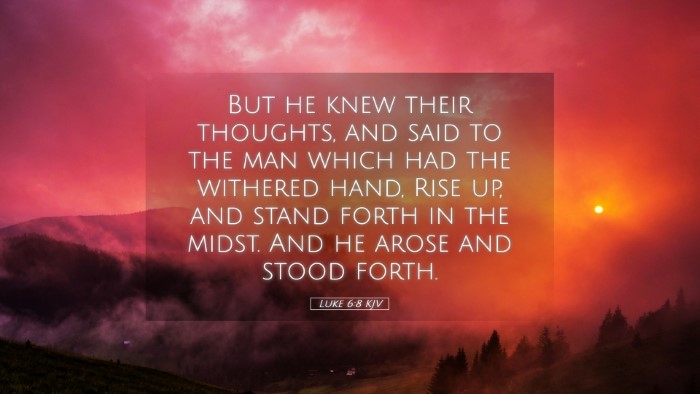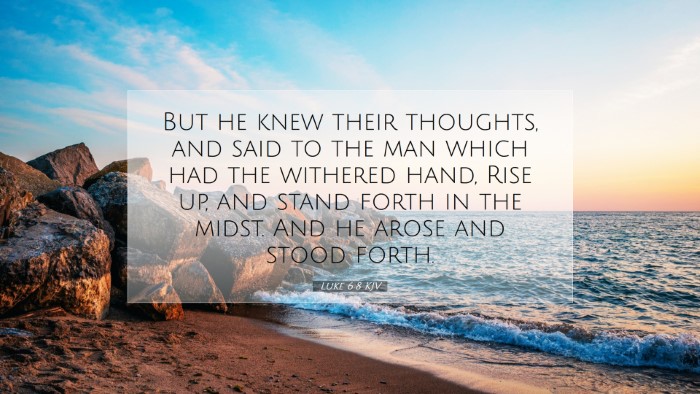Commentary on Luke 6:8
Luke 6:8 states: "But he knew their thoughts, and said to the man which had the withered hand, Rise up, and stand forth in the midst." This verse introduces us to the deeply insightful nature of Jesus' ministry, revealing His divine understanding of human thoughts and conditions.
Understanding the Context
The context of this verse is vital. Jesus, at this point in His ministry, was facing increasing scrutiny from the religious leaders of His time. They were particularly focused on His acts of healing on the Sabbath, which they deemed inappropriate. The setting illustrates the tension between Jesus and the Pharisees, which is a recurring theme in the Gospels.
Divine Awareness of Human Thoughts
“But he knew their thoughts” - This phrase is profound as it reveals the omniscience of Christ.
-
Matthew Henry remarks that Jesus, being God, has the power to discern the thoughts and intentions within the hearts of men. This divine insight praises Christ's authority and foreshadows the deeper understanding of His mission.
-
Albert Barnes emphasizes that God sees the wickedness of the heart. Jesus' knowledge of the thoughts of the Pharisees illustrates the tension between His compassionate ministry and their legalistic mindset.
-
Adam Clarke offers the commentary that people may outwardly appear righteous, but Jesus knows their innermost thoughts and intentions, reinforcing that divine ministry transcends human understanding.
The Command to Rise Up
The command to the man with the withered hand is both an act of healing and a challenge to the contemporary understanding of the Sabbath.
-
Matthew Henry comments that God’s work must always take precedence, even above tradition. Jesus calls the man to rise up, indicating a movement towards restoration that challenges religious norms.
-
According to Albert Barnes, this command serves as a demonstration of Christ's power and authority, inviting the man into a transformative experience that goes beyond mere physical healing.
-
Adam Clarke interprets the standing forth in the midst as a call to faithful action, illustrating how faith compels outward expressions of God’s work in our lives.
The Significance of the Withered Hand
The condition of the man’s hand symbolizes spiritual and physical brokenness.
-
Matthew Henry reflects on the withered hand as representing the sin and fragility of humanity. It symbolizes how sin leaves individuals incapacitated and in need of God’s restorative power.
-
Albert Barnes incorporates the idea that physical ailments provide a window into the broader condition of the heart and spirit. Healing becomes an act that speaks to greater issues of faith and trust in God.
-
In his commentary, Adam Clarke suggests that the withered hand serves as an allegory for the spiritual state of Israel, which was seeking healing during a time of legalism and religious fervor, emphasizing the need for a Savior.
The Implications for Ministry
This verse not only narrates an event but also presents various implications for ministry today.
-
Matthew Henry encourages ministers to be bold in the pursuit of God’s work, reminding that the mission often involves confronting societal and religious norms that hinder healing.
-
Albert Barnes emphasizes that the knowledge of Christ’s thoughts serves as a reminder for pastors to reflect on their own motives in ministry, urging them to align with God’s heart.
-
According to Adam Clarke, every sin, struggle, and challenge faced should lead to a greater reliance on Christ, hence any ministry should be rooted in faith that seeks to bring forth transformation.
Conclusion
Luke 6:8 encapsulates core themes of divine awareness, compassionate confrontation, and the transformative power of Christ. As we reflect on these insights from public domain commentaries, it challenges pastors, students, and scholars alike to embrace the fullness of God’s power at work within and through us.
Unity, healing, and faith must be at the forefront of our ministry, as we follow Christ's example of bringing forth wholeness in a broken world.


